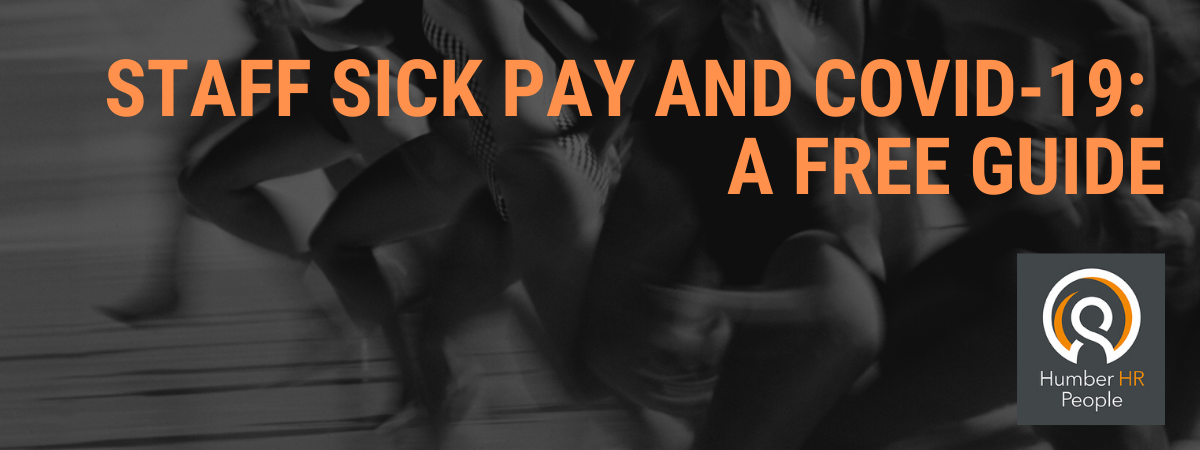HR Snapshot #26: 5 Minute Guide: Staff Sick Pay during Covid-19
Posted on 22nd September 2020 at 14:17
Based on recent questions from the SMEs we support, we have put together this quick guide on Staff Sickness during Coivd-19.
As of 13 March 2020, employees and workers who self-isolate must receive any Statutory Sick Pay (SSP) due to them from the first day they're absent from work if it's because:
they have coronavirus (COVID-19)
they have coronavirus symptoms, for example a high temperature, a new continuous cough or a loss of, or change in, sense of smell or taste
someone in their household has coronavirus symptoms
they have been advised to stay at home by their doctor because of an underlying health condition
they have been told to self-isolate by a doctor or NHS 111
they've been told to self-isolate by a government 'test and trace' service, because they've been in close contact with someone who tested positive ('NHS Test and Trace' in England, 'Test and Protect' in Scotland or 'Test, trace, protect' in Wales)
To be eligible for SSP, employees and workers must be off work for at least 4 days in a row. This includes non-working days. Some employers can claim back up to 2 weeks' SSP they've paid to anyone because of coronavirus. Find out more about claiming back SSP due to coronavirus on GOV.UK.
Bear in mind that the contract you have in place with your employees may offer more than SSP – 'contractual' sick pay. If an employee or worker cannot work, they should tell you as soon as possible, including the reason they cannot work and how long they are likely to be off work for.
If someone has symptoms or has tested positive
If someone has symptoms or has tested positive for coronavirus, they must self-isolate (stay at home) for at least 10 days. Anyone else in their household must self-isolate for 14 days.
If anyone else in the household starts displaying symptoms or tests positive, they must self-isolate for at least 10 days. This is regardless of where they are in the 14-day isolation period.
If someone is told to self-isolate by a test and trace service
If a government 'test and trace' service tells someone they've been in close recent contact with someone who has tested positive, they must self-isolate for 14 days. If they develop symptoms, everyone else in their household must self-isolate for 14 days.
Sickness Reporting Process
Employees in self-isolation need to follow their workplace's usual sickness reporting process. Employees can 'self-certify' for the first 7 days off work. This means following their workplace process but not having to get a note from a doctor or NHS 111. Those self-isolating due to coronavirus for more than 7 days can get an online self-isolation note from the:
• NHS website
• NHS mobile phone app – for those registered with a GP in England
It's a good idea to check your policy on absence from work. Employers might need to be flexible if asking for self-isolation notes. For example, an employee with severe symptoms might not be able to get a note straight away.
Self-Isolating after returning to the UK
Some people returning to the UK must self-isolate (or 'quarantine') for 14 days, depending on the country they have travelled from. As an employer, you have a duty of care to ALL employees, which means it is reasonable to ask the person where they have travelled to whilst on annual leave, so that you know if they will need to self-isolate.
Employees or workers are not entitled to SSP if they're self-isolating after returning from holiday or business travel and they cannot work from home. They may be entitled to SSP for another reason, for example if they have coronavirus symptoms. An employer can choose to pay the employee an amount equivalent to SSP, or a higher amount of pay, if they want to.
We highly recommend that you review and update your sickness policy in the light of Covid-19. The advice above is given without liability and we recommend you contact a qualified HR professional for individual concerns.
Contact us today for a PDF version of this guide, to subscribe to our newsletter or for further guidance
Email: hello@humberhrpeople.co.uk
Share this post:




